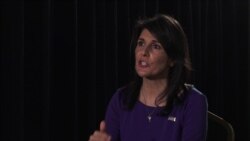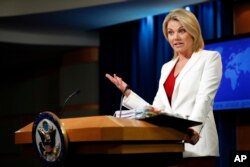The U.S. ambassador to the United Nations said Wednesday that the Palestinian Authority was "not serious" about the peace process, and she threatened to withhold future funding if they did not move toward talks.
"We are not going to reward bad behavior," Nikki Haley told VOA contributor Greta van Susteren in an interview at her office. "Here you've got the Palestinians who are basically saying they are going to cut the U.S. out of the peace process. They are saying that they no longer want to have anything to do with us."
WATCH: Haley on Palestinians: 'Not Going to Reward Bad Behavior'
Following President Donald Trump's December 6 decision to recognize Jerusalem as the capital of Israel and move the U.S. Embassy there, Palestinian President Mahmoud Abbas said the U.S. could no longer be a mediator.
"We do not accept any role of the United States in the political process from now on, because it is completely biased towards Israel," Abbas told an emergency meeting of the Organization of the Islamic Cooperation in Istanbul on December 13.
On Tuesday, the State Department announced that it was withholding $65 million from its initial 2018 contribution of $125 million to the U.N. agency that supports Palestinian refugees, known as UNRWA.
"This is not aimed at punishing anyone," State Department spokeswoman Heather Nauert said during the announcement. "The United States government and the Trump administration believe that there should be more so-called burden sharing to go around."
But Haley's comments Wednesday appeared to contradict that.
"They go and take us to the United Nations and are basically very hostile in what they say and what they do," the ambassador said in the interview. "We are not going to pay to be abused. It doesn't make sense."
Haley said that after the $60 million disbursement to UNRWA, the U.S. would "re-evaluate the relationship."
Last year, Washington contributed $364 million to UNRWA, making it the agency's top donor.
UNRWA provides education and health services to 5 million registered Palestinian refugees in the West Bank, Gaza Strip, Syria, Lebanon and Jordan.
UNRWA chief Pierre Krahenbuhl said Wednesday that he was looking for "new funding alliances" in the wake of the U.S. decision, which he said had left the agency with the most critical financial situation it has ever faced.
Haley suggested that UNRWA could find new donors among the countries that did not support the United States last month during a U.N. General Assembly vote on a resolution rejecting the U.S. decision on Jerusalem.
"You have 120 countries who voted against us that could more than take up the level of debt that UNRWA has," Haley said.
"We want a peace process between the Israelis and the Palestinians," Haley continued. "We want to make sure that moves forward. By the Palestinians cutting us out of the peace process, it shows they are not serious in truly getting to peace."
Victor Beattie contribued to this report.








